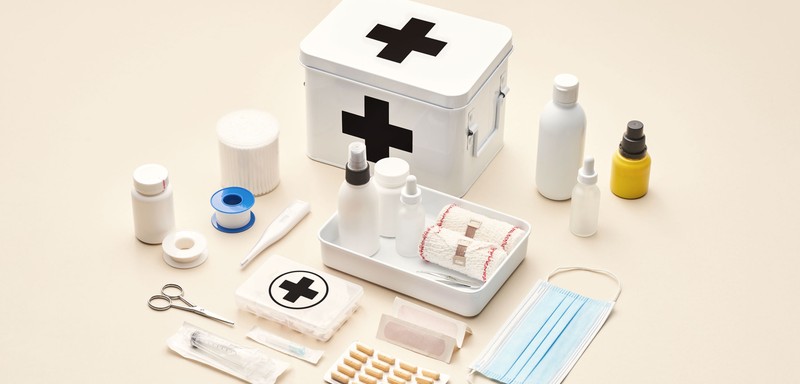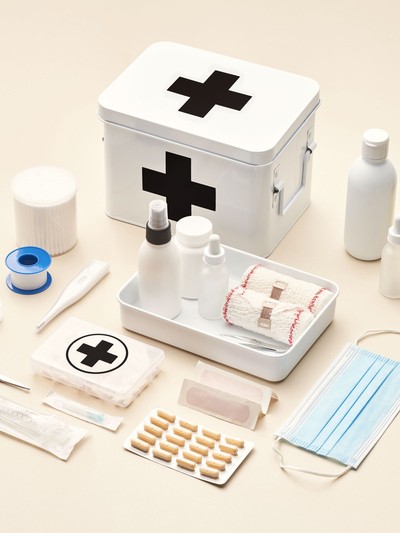

Everything Grandparents Should Know About First Aid
Why is learning first aid as a grandparent so important?
More and more these days, grandparents play a formal role in childcare, as well as the more informal role they have always played. A first aid incident can occur anytime, anywhere, so at Mini First Aid we encourage as many grandparents as possible to learn first aid. After all, it is better to know it and not need it, than need it and not know it.
Give us some of the scenarios when a child or baby might need first aid?
- Burns – especially from hot drinks, are incredibly common as curious little hands like to explore. Always push your kettle to the back of the kitchen worktop, turn pan handles in on stoves and keep hot drinks out of reach.
- Choking – this is the number one first aid fear for parents and grandparents attending a Mini First Aid class. Common choking hazards include grapes, cherry tomatoes and mini sausages which need to be quartered lengthways.
- Bleeds – are also really common, especially in children learning to walk. We always say that, if blood can get out, germs can get in; so it’s really important to have a first aid kit with you on days out so you can clean up the wound and seal it with a plaster.
What are the main differences between first aid administered to a baby as opposed to an older child?
The main difference is CPR, as there are different techniques needed. I recommend watching this video to find out how to administer CPR on a baby and this one for children over a year old. There is no substitute for learning first aid in person, though, and you can learn all of the above techniques at our two-hour baby and child first aid class.
At what point do you call 999 assuming that first aid isn't working?
If your baby or child is not breathing, you must call 999 immediately – this is a medical emergency. If your baby or child is unconscious, ask someone else to call 999 immediately, while you commence first aid treatment. If you are on your own, put your phone onto speakerphone so you can continue to administer first aid whilst calling for help. In a burn accident, if the burn is larger than a 50p piece, call 999 before commencing first aid for burns. If you have used abdominal manoeuvres in a choking incident, you must seek medical advice following the incident. When it comes to childhood illnesses, you will know your grandchild best. Trust your instincts – you will know when they’re not behaving normally and, if you’re concerned, seek immediate medical assistance.
Tell us a bit more about administering first aid when (a) a child under one is choking (b) older children are choking?
For a choking baby, start by administering five back slaps and up to five chest thrusts (using a jabbing motion). Check if anything comes out. If nothing has come out, call 999. Keep working in cycles of five back slaps and five chest thrusts until help arrives. For children over the age of one and up to puberty, encourage the child to cough. Then, administer five back slaps between their shoulder blades. Check if anything comes out and check their mouth. Do up to five abdominal thrusts using a clenched fist between the tummy and breastbone, with your other hand over the top and in an inwards and upwards motion. Check if anything comes out. If nothing has come out, call 999. Keep working in cycles of five back slaps and five chest thrusts until help arrives.
Can first aid help prevent sudden infant death syndrome (SIDS)?
We teach parents and grandparents about safe sleep at our Baby Proofing home safety class. In this two-hour session, you’ll get a first aid refresher and learn how to baby proof your house to prevent accidents, giving you a clear plan to take home and implement.
What advice can you offer in the event of a child having a seizure?
Febrile seizures are fits that can happen when a child has a fever. Around one in 20 children will have at least one febrile seizure at some point. They most often happen between the ages of six months and three years, the age at which we are unable to regulate our body temperature properly. Illnesses which bring on a fever such as chicken pox, flu, ear infections and tonsilitis are some of the more common causes of febrile seizures, although it’s important to remember they don’t usually cause seizures.
How should you react to a febrile seizure?
Stay calm and remember this is just the body’s way of coping with an unusually high temperature. Place the baby/child on their side with their head tilted back. Stay with them and try to keep a note of how long the seizure lasts. Do not put anything in their mouth, including medicine or a thermometer, as this could cause injury or tongue biting. Cool them by removing additional layers of clothing and, finally, call 999 and ask for an ambulance, making them aware if you think the seizure has been caused by a serious illness like meningitis.
If a child bangs their head, what kind of treatment can a grandparent administer?
Bumps to the head are very common in little ones. Use a cold compress like these Elly bump pads or a wet and clean muslin or t-shirt – whatever you have to hand and apply to the bump to cool and soothe. Make sure your grandchild sits down for at least ten minutes and monitor them for signs of concussion. As hard as it is, don’t let them engage in any rough play or running around following a bump to the head. You need to be aware that the following might be signs of a more serious concussion:
- headache
- feeling sick or being sick
- mild dizziness – children may describe feeling “wobbly”
- losing consciousness, even if only briefly
- difficulty staying awake
If your grandchild experiences any of these signs or is behaving in a way not usual for them, seek medical advice.
Tell us about first aid courses grandparents can take and what they can expect to learn on them?
Our two-hour baby and child class is ideal for grandparents. It gives you peace of mind for those little accidents that can occur on days out and the knowledge needed to save a life in an emergency situation. As well as learning about CPR and how to deal with choking, grandparents will learn how to cope with burns, breaks, bleeds and bumps. Our knowledgeable trainers will also talk grandparents through the signs and symptoms of potentially life-threatening meningitis and septicaemia.
Finally, can you tell us what should be in a well-stocked medicine cabinet?
A first aid kit is an absolute must and should contain:
- bandages
- tape
- sterile wipes
- plasters in lots of shapes and sizes
- tweezers
- thermometer
All of the above is included in our family first aid kit but you can also check out our Mini First Aid blog “How to put together a family medical cabinet” for more advice.
Visit MiniFirstAid.co.uk for more information.
Inspired? Here are five first-aid courses worth signing up to…
BEST ALL-ROUND COURSE:
Daisy First Aid
All of Daisy’s CPD-accredited courses come highly recommended – which is why they’re often the provider of choice when it comes to first aid training in schools and nurseries. However, it also runs family first aid courses aimed at grandparents, parents or carers, which cover basic first aid and emergency life saver training. Courses cover treatment of an unconscious casualty; baby and child recovery positions; shock, baby and child resuscitation and CPR; baby and child choking; head injuries; fever, febrile seizures, bleeding, burns, fractures, anaphylaxis, meningitis; and other childhood conditions. A two-hour paediatric first aid course for four or more people costs £25 per person and can be hosted either online, at home or at a nearby venue.
Visit DaisyFirstAid.com
BEST ONLINE OPTION:
Online First Aid
If you need to complete a course quickly, but thoroughly, the First Aid for Grandparents course from Online First Aid is hard to beat. Costing £87, it covers numerous topics, including action in an emergency; heart attack and angina; the recovery position; resuscitation; choking; drowning; asthma; anaphylactic shock; wounds and bleeding; shock; fainting; bites and stings; burns; poisoning; breaks, sprains and dislocations; and head injuries. The course – which has been written by Emma Hammett, a qualified nurse, first aid trainer and founder of First Aid for Life – consists of illustrated step-by-step directions, flow charts, diagrams, videos and tests that are fully compatible with all computers and mobile devices. You will be able to stop and start as often as you like and print your certificate on completion. You’ll also have continuous access to the course for 12 months.
Visit OnlineFirstAid.com
BEST FOR CHILDREN OF ALL AGES:
British Red Cross
With prices starting from £37.50, this course is for anyone who wants to learn baby and child first aid for their everyday life – rather than as a requirement of their job. Ideal for grandparents and anyone who is often around babies and children, the four-hour course will guide you through exactly what you need to know, covering a range of childhood emergency situations – from choking and unresponsiveness to fever and meningitis – and will be suitable for children of all ages from birth to puberty. You'll also receive a free first aid workbook full of helpful advice which can be taken home and used to refresh your knowledge.
BEST IN-PERSON TRAINING:
Tiger Lily
This one-day practical course with one of Tiger Lily’s qualified first aid trainers – the majority of whom come from a paramedic or nursing background – covers the first aid essentials for anyone living with or caring for babies and children. Taking place on both mid-week and weekend dates, and starting at 9.30am and finishing at around 5pm, all you need to do is find the closest Tiger Lily training venue to take part. Alternatively, its trainers can deliver this course at your home or a private venue for group bookings. In-person courses cost £85 per person, while group bookings and private tuition starts at £475.
Visit TigerLilyTraining.co.uk
BEST FOR THOSE ON A BUDGET:
St John’s Ambulance
If shelling out for a first aid course just isn’t on the cards right now, there are plenty of useful tips you can pick up by way of St John’s Ambulance and its online video tutorials. Via its paediatric first aid pages, prospective grandparents can learn about myriad topics, including how to put children in the recovery position, croup, chicken pox, CPR and hypothermia. Most of the resources are completely free to access any time – perfect for anyone on a budget or who just wants to refresh their memory.
Visit SJA.org.uk
DISCLAIMER: We endeavour to always credit the correct original source of every image we use. If you think a credit may be incorrect, please contact us at info@sheerluxe.com.

